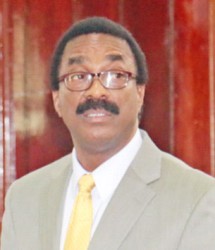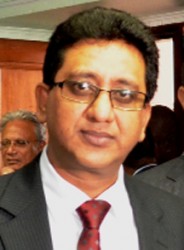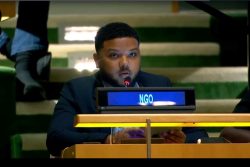A three-year tussle over anti-money laundering legislation came closer to conclusion yesterday with the new APNU+AFC government passing its first bill in the 11th Parliament.
The bill will now be forwarded for the assent of President David Granger and then the global watchdog Financial Action Task Force (FATF) will have to rule on whether it complies with its best-practices model.
The much contested Anti-Money Laundering and Countering the Financing of Terrorism (AML/CFT) (Amendment) Bill had been under discussion since 2012 and a PPP/C version of it tabled in 2013 failed to win approval as the opposition-controlled majority in the 10th Parliament wanted deeper safeguards and more expansive legislation. The standoff saw Guyana being blacklisted by the Caribbean Financial Action Task Force (CFATF) and the FATF.

Yesterday, in the absence of the PPP/C which has boycotted Parliament in protest over the results of the May 11th, 2015 general elections, APNU+AFC MPs debated the bill for a second time after it had had its first reading on Thursday. It was later taken through to its third reading and passage in short order. It took less than 30 minutes for the 25-clause bill to be approved.
The AML/CTF Amendment bill seeks to strengthen Guyana’s regime for combating money laundering. In presenting the bill for its second reading, Attorney General Basil Williams recounted its “checkered” history in the house. First presented on 22 April, 2013 as Bill no.12 of 2013, the AML/CTF bill had been the subject of haggling between the two sides of the house for two years during which time it was twice laid before the House, twice sent to a special select committee for consideration and twice rejected by the majority opposition.
The then opposition side of the House, now Government had refused to approve the bill presented by the PPP/C government. Instead the joint opposition had prepared its own version of the bill. This version was laid before the parliament on Thursday as Bill no.4 of 2015 for its first reading.
Williams in a brief defence of the bill responded to criticisms raised by PPP/C at Freedom House on Thursday.
Former Attorney General and PPP Executive Anil Nandlall stated at a PPP press conference that with the proposed amendments to the PPP/C’s 2013 version, the bill is prone to “contamination” by Politically Exposed Persons (PEP).

Nandlall said that the APNU+AFC amendments to the 2013 bill seeking to have the Director and staff of the Financial Intelligence Unit (FIU) appointed by politicians in the National Assembly went against the warning about PEPs by the global watchdog group, the FATF.
Nandlall argued that “what they have done in this bill is to take politically exposed persons who are MPs and make them the appointing authority for the FIU. This (FATF) document basically tells you to insulate them from the investigative and monitoring arm of AML/CFT infrastructure and bodies that are there to investigate.”
In his presentation, Williams referred to the structure of the PPP/C bill as “untenable.” He charged that in the 2013 version of the bill, the head of the FIU was entirely under the control of the PPP/C, as he was appointed by the finance minister and could be dismissed by the President. In that vein “the main changes that we had proposed to the parent act related to governance,” said Williams.
The version passed yesterday sees the director of the FIU being selected by members of a committee appointed by the legislature. Both the director and the committee will have to be presented to and approved by the 65-seat legislature.
“I don’t know where the criticism comes from that 65 persons cannot be better than one person, if we are thinking that they could be corrupted”, Williams noted.
He maintained that the process to now oversee the Financial Intelligence Unit is the best it can possibly be. “I don’t know where you can find a more transparent process than that…This authority is not intended to rob the FIU of their independence, in fact the provision states clearly that the authority will not interfere in the day to day runnings of the FIU,” Williams pointed out.
Additional criticism had come from PPP executive member Gail Teixeira who criticised APNU+AFC’s amendment to Section 37 of the act. The new section – 37A in the Principal Act provides that a police officer, a customs officer or a person authorised by the Director of the Financial Intelligence Unit may seize and detain cash anywhere in Guyana where the amount is more than ten million dollars. There must however be proof that these sums were generated by or are being used to finance criminal activity such as terrorism and human trafficking.
Teixeira had noted that this like the Parliamentary power to appoint and dismiss FIU staff was not a FATF requirement. “It is noted that no deficiency with respect to this obligation was noted in Guyana’s Mutual Evaluation Report for the Third Round,” Teixeira said.
In defending this amendment Williams guaranteed “It can’t be done whimsically, the act requires that there be cogent evidence; they cannot seize cash in the possession of persons doing business or engaged in trade or commerce. They can’t wake up and decide to target Mr A or Mr B; they must be armed with information and evidence provided either by FIU or the Special Organised Crimes Unit (S.O.C.U).”
According to Williams a whimsical detention and seizure would expose the agent to charges of malicious prosecution.
Guyana has been lobbying to gain full international compliance and has missed these opportunities since 2013 having failed to conform to the FATF’s requirement of passing the necessary legislation.
FATF in July 2014 informed the government that it would be executing a targeted review of Guyana’s AML/CFT infrastructure. The review, the FATF said, would be conducted by the Americas Regional Review Group of the International Cooperation Review Group. Again in October 2014, Guyana was able to avoid blacklisting by the FATF after a review by the FATF’s International Co-operation Review Group, in Paris.
Yesterday’s passage of this AML Bill is expected to bring Guyana in compliance with the requirements of the Caribbean Financial Action Task Force (CFATF).
Critics had said that the PPP/C government had known for several years prior to 2011 that amendments were needed to the anti-money laundering framework but did nothing about it. (Thandeka Percival)







